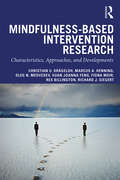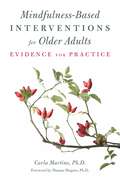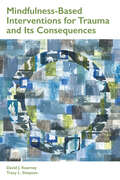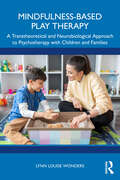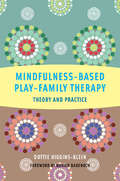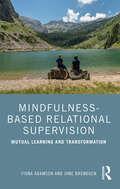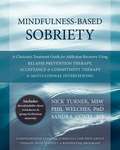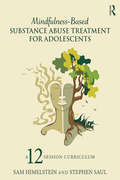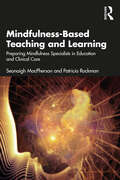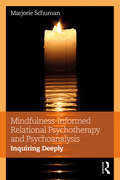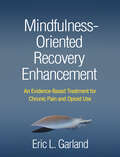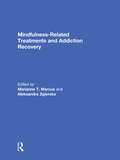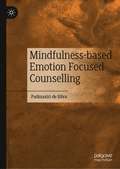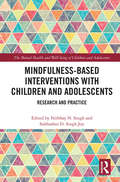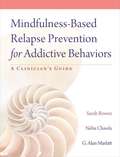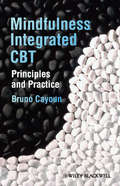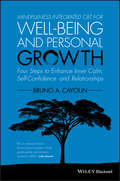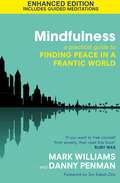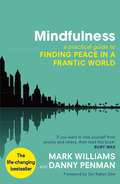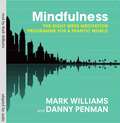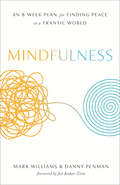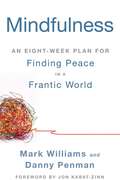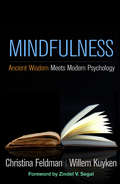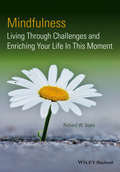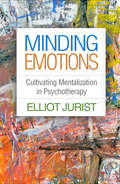- Table View
- List View
Mindfulness-Based Intervention Research: Characteristics, Approaches, and Developments
by Richard J. Siegert Marcus A. Henning Christian U. Krägeloh Fiona Moir Rex Billington Oleg N. Medvedev Xuan Joanna FengThis book provides an outline and critical discussion of the characteristics of mindfulness-based interventions (MBIs) research. Since the first reports on the use of mindfulness practices in health interventions, a large body of research literature has emerged to document the effectiveness of MBIs for reducing psychological distress and to increase well-being. The integration of mindfulness into very diverse psychological theories makes it a unique concept in psychology that has generated a large amount of interest both in academic research but also the broader media. With this growing literature, mindfulness researchers have also recognised the need to be more critical of its developments, such as how MBIs are presented to the public or what types of research methods are used to test claims of an MBI’s effectiveness. This book examines the large variety of approaches in which MBIs have been studied, including an outline of the philosophical underpinnings of MBI research, definition and measurement of mindfulness, the use of qualitative and quantitative research methods, research design, and research that addresses cultural and religious factors. The book contributes to increased awareness of the current direction of MBI research and thus seeks to contribute to further methodological refinement and sophistication of the research field. This book on the characteristics of research on MBIs is a must read for any researcher or practitioner interested in this fascinating topic.
Mindfulness-Based Interventions for Older Adults: Evidence for Practice
by Carla MartinsBased on extensive clinical research, this book sheds new light onto how Mindfulness Based Stress Reduction (MBSR) can be used with older adults as an effective complementary intervention, identifying specific ways in which MBSR programmes can be adapted and fine-tuned to meet the needs of this group. Presenting robust new evidence to support the efficacy of MBSR as a holistic therapeutic approach, the author draws interesting and original conclusions about its positive impact on older people's psychological and spiritual wellbeing, physical health, neuropsychological performance, attitudes towards death and dying and overall quality of life. The lived experiences of older adults taking part in an MBSR programme provide rich first-hand insights into the therapeutic process, and the author draws valuable conclusions about ethical considerations and the responsibilities and personal transformation of the MBSR facilitator. Professionals involved in delivering mindfulness-based interventions to older adults, including psychologists, counsellors, spiritual directors and physicians, will find this to be essential reading. It will also be of interest to students, academics and researchers wishing to keep abreast of the latest research and developments in the MBSR field.
Mindfulness-Based Interventions for Trauma and Its Consequences (Concise Guides on Trauma Care Series)
by David J. Kearney Tracy L. SimpsonThis book shows practitioners how to use mindfulness‑based interventions to treat PTSD and related conditions. People suffering from posttraumatic stress disorder (PTSD) and other consequences of trauma face daunting challenges. Although many clinical treatments target symptoms of PTSD, an optimal treatment strategy would also address the many health problems that co-occur, such as chronic pain, substance misuse, and depression. To address this need, this book offers mindfulness‑based interventions (MBIs). These therapeutic treatments aim to change the patient&’s relationship to thoughts, emotions, bodily sensations, and associated behaviors through an attitude of non-judgment, curiosity, openness, acceptance, and kindness. MBIs can help clients at any stage of recovery and be used in tandem with standard PTSD therapies. David Kearney and Tracy L. Simpson show practitioners how to guide the patient through meditation practices such as breathing meditation, body scan meditation, or mindful movement to address symptoms including rumination, guilt and shame, avoidance, and hypervigilance, as well as comorbid conditions such as depression, chronic pain, and substance misuse. The authors discuss the research supporting this approach, and offer practical suggestions to help therapists implement MBIs with their clients.
Mindfulness-Based Play Therapy: A Transtheoretical and Neurobiological Approach to Psychotherapy with Children and Families
by Lynn Louise WondersMindfulness-Based Play Therapy is a transtheoretical and neurobiologically informed guide rooted in the belief that the therapeutic alliance is essential to play therapy’s effectiveness.In these pages, clinicians will find the tools they need to help children and families use mindfulness to increase attentional focus and enhance sensory processing, emotion regulation, and reflective awareness. Clinicians will also find a variety of non-directive and directive play-based therapeutic experiences to use in sessions as well as a set of evidence-based practices that supports children with anxiety disorders, trauma, and neurodivergence.
Mindfulness-Based Play-Family Therapy: Theory and Practice
by Dottie Higgins-Klein<P> Incorporating mindfulness and family therapy into play-family sessions. When a child is offered a space to relax the “busy mind,” his experience is comparable to mindfulness meditation. Therapists can help children remain in this calm state—in the state of the present moment—if they have the right tools and techniques to do so. During this stillness, a child can reach a level of consciousness that is parallel to the deepened awareness that occurs during mindfulness meditation. Conducting play sessions in this stage allows for healing and progress. Not only can the symptoms of children’s pain be reduced in intensity and duration, but their self-esteem can be enhanced. <P> This book presents a new and comprehensive framework for helping children through play therapy within the context of the family and incorporating ideas from the practice of mindfulness. This experience-based therapeutic model respectfully derives from the best roots of traditional family therapy and play therapy modalities. Additionally, it draws from child development theory, interpersonal neurobiology, and mindfulness. Either spontaneous play or directed play can be used according to the need.
Mindfulness-Based Relational Supervision: Mutual Learning and Transformation
by Fiona Adamson Jane BrendgenMindfulness-Based Relational Supervision explores a relational and mindfulness-based approach to adult learning and development that is mutually transformational. The initial focus of the book is a case study that shows the evolution of a dialogical supervision relationship that was transformational for both parties. The authors present their reflections and analysis of key transformational moments that brought insights which significantly enhanced their personal and professional development. The authors adopt an interdisciplinary approach, discussing relational neurobiology and relational mindfulness practice together with ideas from child and adult development, attachment theory, intersubjectivity, somatic experiencing, and adult learning theories. The case study narrative charts the development of the authors’ supervision relationship, following which they share a meta-perspective on their learning journey. Finally, they discuss the implications of the study for the education and training of relational practitioners in supervision, coaching, and related fields. The book will appeal to students, practitioners and supervisors in the helping professions, in particular counselling, psychotherapy, and coaching.
Mindfulness-Based Sobriety: A Clinician's Treatment Guide for Addiction Recovery Using Relapse Prevention Therapy, Acceptance and Commitment Therapy, and Motivational Interviewing
by Nick Turner Phil Welches Sandra ContiMindfulness-Based Sobriety presents a breakthrough, integrative approach to addiction recovery to help you treat clients recovering from substance abuse and addiction using mindfulness-based therapy, motivational interviewing, and relapse prevention therapy. Research has indicated that mindfulness-based therapy is highly effective in treating emotion dysregulation, stress, depression, and grief—all emotions that lie at the root of addiction. Motivational interviewing is helpful in treating addiction because it helps clients learn to change the behaviors that cause addiction. And finally, relapse prevention therapy teaches individuals with addiction to anticipate and cope with potential relapse. This book combines all three of these highly effective treatments.
Mindfulness-Based Substance Abuse Treatment for Adolescents: A 12-Session Curriculum
by Sam Himelstein Stephen SaulMindfulness-Based Substance Abuse Treatment for Adolescents is a group-based curriculum incorporating mindfulness, self-awareness, and substance-abuse treatment strategies for use with adolescents dealing with substance use. The evidence-based, how-to format provides a curriculum for professionals to implement either partially, by picking and choosing sections that seem relevant, or in full over a number of weeks. Each session comes equipped with clear session agendas, example scripts and talking points, what-if scenarios that address common forms of resistance, and optional handouts for each session. Sections cover the major principles of working with adolescents—relationship building, working with resistance, and more—along with a full curriculum. The book is a natural fit for psychotherapists, but addiction counselors, school counselors, researchers, mentors, and even teachers will find that Mindfulness-Based Substance Abuse Treatment for Adolescents changes the way they work with young people.
Mindfulness-Based Teaching and Learning: Preparing Mindfulness Specialists in Education and Clinical Care
by Patricia Rockman Seonaigh MacPhersonMindfulness-Based Teaching and Learning is the first comprehensive survey text exploring the history, research, theory, and best practices of secular-scientific mindfulness. With a focus on how mindfulness is taught and learned, this book is an invaluable resource for aspiring or expert mindfulness specialists. Integrating and defining the emerging field of MBTL within a common purpose, evidence-base, and set of transprofessional—and transformational—practices, the book provides both a visionary agenda and highly practical techniques and tools. Chapters provide curriculum design and teaching tips, explore the expert-validated MBTL-TCF competency framework, and reveal insights into the ways self-awareness can evolve into ecological awareness through intensive retreats.
Mindfulness-Informed Relational Psychotherapy and Psychoanalysis: Inquiring Deeply
by Marjorie SchumanMindfulness-Informed Relational Psychotherapy and Psychoanalysis: Inquiring Deeply provides a refreshing new look at the emerging field of Buddhist-informed psychotherapy. Marjorie Schuman presents a cogent framework which engages the patient at the levels of narrative, affective regulation, and psychodynamic understanding. Blending knowledge of contemporary psychoanalysis with the wisdom of Buddhist view, she examines how mindfulness can be integrated into psychodynamic treatment as an aspect of self-reflection rather than as a cognitive behavioral technique or intervention. This book explores how mindfulness as a "self-reflective awareness practice" can be used to amplify and unpack psychological experience in psychodynamic treatment. Schuman presents a penetrating analysis of conceptual issues, richly illustrated throughout with clinical material. In so doing, she both clarifies important dimensions of psychotherapy and illuminates the role of "storyteller mind" in the psychological world of lived experience. The set of reflections comprises an unfolding deep inquiry in its own right, delving into the similarities and differences between mindfulness-informed psychotherapy, on the one hand, and mindfulness as a meditation practice, on the other. Filling in an outline familiar from psychoanalytic theory, the book explores basic concepts of Self, Other, and "object relations" from an integrative perspective which includes both Buddhist and psychoanalytic ideas. Particular emphasis is placed on how relationship is held in mind, including the dynamics of relating to one’s own mind. The psychotherapeutic approach described also delineates a method for practicing with problems in the Buddhist sense of the word practice. It investigates how problems are constructed and elucidates a strategy for finding the wisdom and opportunities for growth which are contained within them. Mindfulness-Informed Relational Psychotherapy and Psychoanalysis demonstrates in clear language how the experience of Self and Other is involved in emotional pain and relational suffering. In the relational milieu of psychotherapy, "Inquiring Deeply" fosters emotional insight and catalyzes psychological growth and healing. This book will be of great interest to psychoanalytically-oriented clinicians as well as Buddhist scholars and psychologically-minded Buddhist practitioners interested in the clinical application of mindfulness.
Mindfulness-Oriented Recovery Enhancement: An Evidence-Based Treatment for Chronic Pain and Opioid Use
by Eric L. GarlandThe opioid crisis arose in part due to the attempt to relieve chronic pain. Meeting a huge need, this is the authoritative presentation of Mindfulness-Oriented Recovery Enhancement (MORE) for chronic pain and opioid use. MORE is one of the few evidence-based treatments shown to simultaneously reduce opioid use and/or addiction, pain, and co-occurring emotional distress. MORE integrates mindfulness training with principles of cognitive-behavioral therapy and positive psychology. In a convenient large-size format, the book provides everything needed to set up and run MORE groups. Treatment developer Eric L. Garland supplies session-by-session guidelines, sample scripts, clinical pointers, guided practices, and psychoeducational resources, including 16 reproducible handouts that can be photocopied or downloaded.
Mindfulness-Related Treatments and Addiction Recovery
by Marianne T. Marcus Aleksandra ZgierskaWhile mindfulness meditation has been used in clinical settings as an adjunctive treatment for substance use disorders for some time, there has been limited empirical evidence to support this practice. Mindfulness-Related Treatments and Addiction Recovery bridges this gap by reporting the findings of studies in which mindfulness practice has been combined with other behavioural treatments and/or adapted to meet the needs of a variety of client populations in recovery. Therapies used as interventions in the described studies include Mindfulness-Based Stress Reduction (MBSR), Mindfulness-Based Cognitive Therapy (MBCT), Dialectical Behavior Therapy (DBT), Acceptance and Commitment Therapy (ACT), Mindfulness-Based Relapse Prevention (MBRP), and Mindfulness-Based Therapeutic Community (MBTC) treatment. The book offers a glimpse into the many ways in which mindfulness strategies have been applied to various facets of the recovery process including stress, craving, anxiety, and other relapse related factors. Preliminary evidence, while not conclusive, suggests that mindfulness-based therapies are effective, safe, satisfying to clients, and that an individual, at-home mindfulness practice can be potentially sustained over time, beyond the intervention duration. This book was originally published as a special issue of Substance Abuse.
Mindfulness-based Emotion Focused Counselling
by Padmasiri de SilvaThis book examines the use of Buddhist ideas, particularly mindfulness, to manage a broad spectrum of emotions and to address social and economic issues impacting the world, such as climate change. Beginning with a brief history of emotion studies, it highlights how recent developments in neuroscience and cognitive science have paved the way for exploring the utility of Buddhist concepts in addressing various psychological and social problems in the world. It profiles a wide range of emotions from Western and Buddhist perspectives including anger, sadness, depression, pride, and compassion, and analyses the integration of Buddhist ideas into modern clinical practice. Finally, the author demonstrates the utility of mindfulness in the regulation of emotions in various settings, including psychiatric clinics, schools, and businesses. Anchored in the Buddhist tradition this book this book provides a unique resource for students and scholars of counselling, psychotherapy, clinical psychology and philosophy.
Mindfulness-based Interventions with Children and Adolescents: Research and Practice (The Mental Health and Well-being of Children and Adolescents)
by Nirbhay N. Singh Subhashni D. Singh JoyThis book comprehensively reviews mindfulness-based interventions for specific areas of functioning in children and adolescents, with refreshing insights and perspectives. Based on a solid foundation of research and practice, it presents the nature of mindfulness, examines the psychological processes that may underlie mindfulness, and explores how to assess it. Mindfulness is about how we can be attentive to and present for everything that happens in our daily lives. This book draws upon current research in the field in order to explore topics such as the fundamentals of teaching mindfulness to children and adolescents; assessment of mindfulness in this population; use of mindfulness in educational settings; and clinical applications in mental health, including substance abuse, hyperactivity, and intellectual and developmental disabilities. With contributions from internationally-renowned clinicians and scholars, this book provides a balanced account of the strengths and weaknesses of current research, and how mindfulness-based programs can be used to enhance wellbeing and reduce suffering. This book will be of great interest for academics, scholars and post graduate students involved in the study of the mental health of children and adolescents. It will also appeal to psychologists, psychiatrist, nurses, social workers, rehabilitation therapists and others, such as school counsellors, who provide clinical care to children and adolescents.
Mindfulness-based Relapse Prevention for Addictive Behaviors: A Clinician's Guide
by G. Alan Marlatt Neha Chawla Sarah BowenBowen et al. (psychology and Addictive Behaviors Research Center, U. of Washington) present a relapse prevention program for clients with addictive behavior problems who have completed initial treatment. The program integrates mindfulness practices with evidence-based cognitive and behavioral strategies used in traditional relapse prevention. After describing the program, its development, challenges, lessons learned, and research, they outline eight sessions of group therapy that help to increase awareness of triggers and habitual reactions, and provide methods for coping with urges and cravings related to alcohol and other substance abuse problems. Annotation ©2011 Book News, Inc. , Portland, OR (booknews. com)
Mindfulness-integrated CBT
by Bruno A. CayounMindfulness-integrated CBT: Principles and Practice represents the first set of general principles and practical guidelines for the integration of mindfulness meditation with well-documented and newly developed CBT techniques to address a broad range of psychological dysfunctions.The first book to provide a strong rationale and general guidelines for the implementation of mindfulness meditation integrated with CBT for a wide range of psychological difficultiesIncorporates ancient Buddhist concepts of how the mind works, while remaining firmly grounded in well-documented cognitive and behavioural principlesProvides new insights into established understanding of conditioning principlesIncludes a comprehensive list of frequently asked questions, week-by-week instructions for professionals to facilitate application of the therapy, along with case examples and the inspiring stories of former clients
Mindfulness-integrated CBT for Well-being and Personal Growth: Four Steps to Enhance Inner Calm, Self-Confidence and Relationships
by Bruno A. CayounThis is a clear, streamlined guide to using Mindfulness-integrated Cognitive Behavior Therapy (MiCBT) to improve well-being and manage a range of personal and interpersonal difficulties. Integrates the core principles of Eastern mindfulness with the Western evidence-based principles of CBT Provides simple and practical, step-by-step guidance to understanding and implementing the four stages of MiCBT with helpful FAQ sections, success stories from patients, and free access on the companion website to the author’s MP3 audio instructions for basic and advanced mindfulness meditation techniques Written by the foremost expert in this area, with over 25 years’ experience in mindfulness meditation and training from around the world Perfect for individuals working toward self-improvement on their own, as well as professionals assisting clients in individual or group therapy
Mindfulness: A practical guide to finding peace in a frantic world
by Dr Danny Penman Professor Mark WilliamsMINDFULNESS reveals a set of simple yet powerful practices that can be incorporated into daily life to help break the cycle of unhappiness, stress, anxiety and mental exhaustion and promote genuine joie de vivre. It's the kind of happiness that gets into your bones. It seeps into everything you do and helps you meet the worst that life can throw at you with new courage. The book is based on Mindfulness-Based Cognitive Therapy (MBCT). MBCT revolves around a straightforward form of mindfulness meditation which takes just a few minutes a day for the full benefits to be revealed. MBCT has been clinically proven to be at least as effective as drugs for depression and it is recommended by the UK's National Institute of Clinical Excellence - in other words, it works. More importantly it also works for people who are not depressed but who are struggling to keep up with the constant demands of the modern world. MINDFULNESS focuses on promoting joy and peace rather than banishing unhappiness. It's precisely focused to help ordinary people boost their happiness and confidence levels whilst also reducing anxiety, stress and irritability.
Mindfulness: A practical guide to finding peace in a frantic world
by Dr Danny Penman Professor Mark WilliamsTHE LIFE-CHANGING BESTSELLER - OVER 1.5 MILLION COPIES SOLD'A deeply compassionate guide to self-care - simple and profound' Sir Kenneth Branagh'If you want to free yourself from anxiety and stress, and feel truly at ease with yourself, then read this book' Ruby WaxAuthoritative, beautifully written and much-loved by its readers, Mindfulness: A practical guide to finding peace in a frantic world has become a word-of-mouth bestseller and global phenomenon. It reveals a set of simple yet powerful practices that you can incorporate into daily life to break the cycle of anxiety, stress unhappiness and exhaustion. It promotes the kind of happiness that gets into your bones and allows you to meet the worst that life throws at you with new courage. Mindfulness is based on mindfulness-based cognitive therapy (MBCT). Co-developed by Professor Mark Williams of Oxford University, MBCT is recommended by the UK's National Institute for Health and Care Excellence and is as effective as drugs for preventing depression. But, equally, it works for the rest of us who aren't depressed but who are struggling to keep up with the relentless demands of the modern world. By investing just a few minutes each day, this classic guide to mindfulness will put you back in control of your life once again.
Mindfulness: A practical guide to finding peace in a frantic world
by Dr Danny Penman Professor Mark WilliamsMINDFULNESS reveals a set of simple yet powerful practices that can be incorporated into daily life to help break the cycle of unhappiness, stress, anxiety and mental exhaustion and promote genuine joie de vivre. It's the kind of happiness that gets into your bones. It seeps into everything you do and helps you meet the worst that life can throw at you with new courage. The book is based on Mindfulness-Based Cognitive Therapy (MBCT). MBCT revolves around a straightforward form of mindfulness meditation which takes just a few minutes a day for the full benefits to be revealed. MBCT has been clinically proven to be at least as effective as drugs for depression and it is recommended by the UK's National Institute of Clinical Excellence - in other words, it works. More importantly it also works for people who are not depressed but who are struggling to keep up with the constant demands of the modern world. MINDFULNESS focuses on promoting joy and peace rather than banishing unhappiness. It's precisely focused to help ordinary people boost their happiness and confidence levels whilst also reducing anxiety, stress and irritability.
Mindfulness: An Eight-Week Plan for Finding Peace in a Frantic World
by Mark Williams Danny PenmanThe Life-Changing International BestsellerMindfulness reveals a set of simple yet powerful practices that you can incorporate into daily life to help break the cycle of anxiety, stress, unhappiness, and exhaustion. It promotes the kind of happiness and peace that gets into your bones. It seeps into everything you do and helps you meet the worst that life throws at you with new courage.The book is based on Mindfulness-Based Cognitive Therapy (MBCT). MBCT revolves around a straightforward form of mindfulness meditation which takes just a few minutes a day for the full benefits to be revealed. MBCT has been clinically proven to be at least as effective as drugs for depression and is widely recommended by US physicians and the UK's National Institute for Health and Clinical Excellence—in other words, it works. More importantly it also works for people who are not depressed but who are struggling to keep up with the constant demands of the modern world.MBCT was developed by the book's author, Oxford professor Mark Williams, and his colleagues at the Universities of Cambridge and Toronto. By investing just 10 to 20 minutes each day, you can learn the simple mindfulness meditations at the heart of MBCT and fully reap their benefits. The book includes links to audio meditations to help guide you through the process. You'll be surprised by how quickly these techniques will have you enjoying life again.
Mindfulness: An Eight-week Plan For Finding Peace In A Frantic World
by Mark Williams Danny PenmanFrom one of the leading thinkers on Mindfulness-Based Cognitive Therapy, a pioneering set of simple practices to dissolve anxiety, stress, exhaustion, and unhappiness. In Mindfulness, Oxford professor Mark Williams and award-winning journalist Dr. Danny Penman reveal the secrets to living a happier and less anxious, stressful and exhausting life. Based on the techniques of Mindfulness-Based Cognitive Therapy, the unique program developed by Williams and his colleagues, the book offers simple and straightforward forms of mindfulness meditation that can be done by anyone--and it can take just 10-20 minutes a day for the full benefits to be revealed.
Mindfulness: Ancient Wisdom Meets Modern Psychology
by Willem Kuyken Christina FeldmanHow does mindfulness promote psychological well-being? What are its core mechanisms? What value do contemplative practices add to approaches that are already effective? From leading meditation teacher Christina Feldman and distinguished psychologist Willem Kuyken, this book provides a uniquely integrative perspective on mindfulness and its applications. The authors explore mindfulness from its roots in Buddhist psychology to its role in contemporary psychological science. In-depth case examples illustrate how and why mindfulness training can help people move from distress and suffering to resilience and flourishing. Readers are guided to consider mindfulness not only conceptually, but also experientially, through their own journey of mindfulness practice.
Mindfulness: Living Through Challenges and Enriching Your Life In This Moment
by Richard W. SearsMindfulness: Living Through Challenges and Enriching Your Life In This Moment shows how the ancient practice of mindfulness can help us live a fuller and more enriching life. Presents material through a balance of clinical case work with the author’s personal stories of the Dalai Lama, ninja, and Zen Buddhism Reveals ways that mindfulness can be applied to modern problems based on psychological principles and evidence-based programs Shows how to apply mindfulness principles to a variety of problems, including stress, anxiety, depression, chronic pain, and more Provides guidelines for readers to conduct their own mindfulness training sessions at home
Minding Emotions: Cultivating Mentalization in Psychotherapy (Psychoanalysis and Psychological Science)
by Elliot JuristMentalization--the effort to make sense of our own and others' actions, behavior, and internal states--is something we all do. And it is a capacity that all psychotherapies aim to improve: the better we are at mentalizing, the more resilient and flexible we tend to be. This concise, engaging book offers a brief overview of mentalization in psychotherapy, focusing on how to help patients understand and reflect on their emotional experiences. Elliot Jurist integrates cognitive science research and psychoanalytic theory to break down "mentalized affectivity" into discrete processes that therapists can cultivate in session. Clinical vignettes are interspersed with discussions of published memoirs that examine emotions in the context of autobiographical memory. A reproducible assessment instrument (the Mentalized Affectivity Scale) can be downloaded and printed in a convenient 8 1/2" x 11" size.
